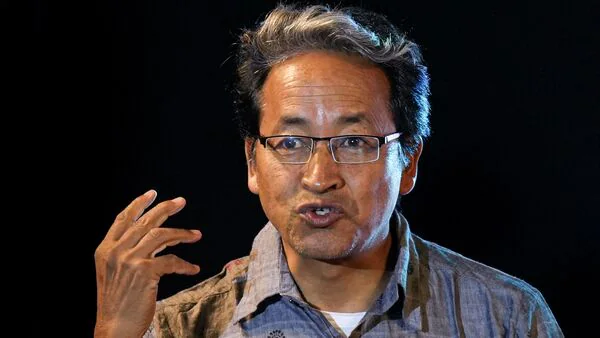
Supreme Court Questions Centre: Why Was Sonam Wangchuk's Wife Denied Notice Of NSA Detention?
The remarks came as the top court issued notices to the Centre, Jammu & Kashmir, and Rajasthan in response to a habeas corpus petition filed by Wangmo, who stated she has not been permitted to meet her husband.
“The grounds of detention have already been served to the detainee, and there is no legal requirement for the grounds of detention to be communicated to the wife,” Solicitor General Tushar Mehta told the bench. He added that he would examine the feasibility of serving a copy of the grounds to Wangmo.
What does the habeas corpus plea say?Filed under Article 32 of the Constitution, Wangmo's petition seeks Wangchuk's release and challenges the legality of his detention under Article 22, asserting that neither she nor her husband were informed of the reasons for his confinement.
“This is all just to portray in media and in that region that he is deprived of medicines and access to wife. Just to create an emotive atmosphere. That's all,” Mehta told the court, countering claims that Wangchuk had been denied medical support or family access.
Wangmo, supported by senior advocates Kapil Sibal and Vivek Tankha, also requested interim relief to ensure medical support for Wangchuk, who declared during a medical examination that he was not taking any medication.
“If any medical supplies were needed, they would be given,” Mehta assured the bench.
Why was Wangchuk detained and transferred?Wangchuk was detained under the NSA on September 26, two days after protests in Ladakh demanding statehood and inclusion under the Sixth Schedule resulted in four deaths and 90 injuries. He was subsequently transferred over 1,000 kilometres to Jodhpur Central Jail in Rajasthan.
The habeas corpus plea alleges that Wangchuk's detention was“not genuinely linked to national security or public order but intended to silence a respected environmentalist and social reformer for espousing democratic and ecological causes.”
It further asserts that the activist engaged only in peaceful Gandhian protests within Ladakh, exercising his constitutional rights to speech and assembly.
“The charges are baseless and floated with the sole object of defaming, maligning and discrediting his peaceful Gandhian movement,” the plea stated, highlighting a purported“systematic campaign” against Wangchuk, including allegations of links with Pakistan and China.
The Supreme Court has scheduled the next hearing for October 14, with the matter remaining under scrutiny.
Legal Disclaimer:
MENAFN provides the
information “as is” without warranty of any kind. We do not accept
any responsibility or liability for the accuracy, content, images,
videos, licenses, completeness, legality, or reliability of the information
contained in this article. If you have any complaints or copyright
issues related to this article, kindly contact the provider above.
Most popular stories
Market Research

- Mutuum Finance (MUTM) New Crypto Coin Eyes Next Price Increase As Phase 6 Reaches 50% Sold
- Bydfi Highlights 'BUIDL' Ethos During Newcastle United Match Against Arsenal
- Flexm Recognized As“Highly Commended” In The Regtech Category At The Asia Fintech Awards Singapore 2025
- Solotto Launches As Solana's First-Ever Community-Powered On-Chain Lottery
- Moonx: The Leading Crypto Trading Platform With X1000 Leverage And Unlimited Meme Coin Access
- Stonehaven Circle Marks 13Th Anniversary With Hadrian Colwyn Leading Calvio Ailegacyx Innovation




















Comments
No comment